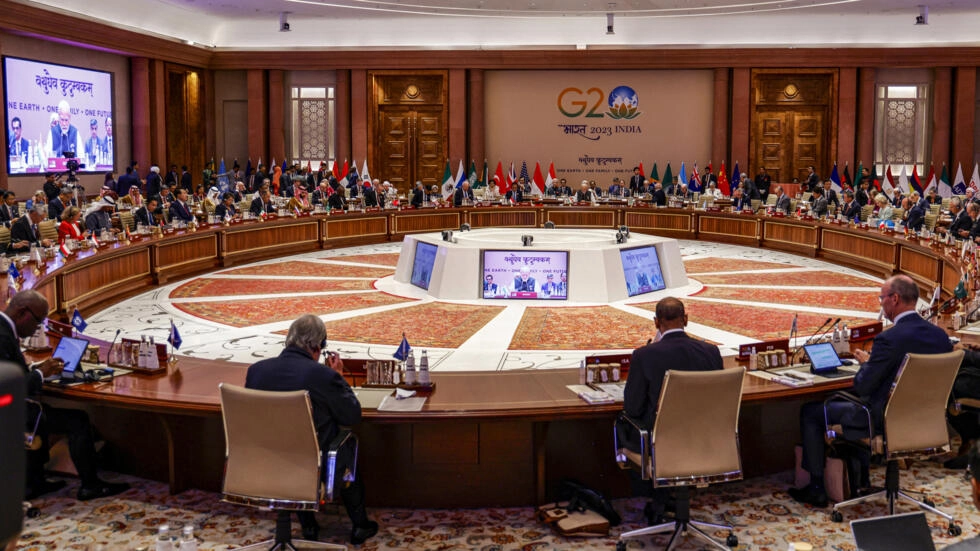The African Union has officially become a new member of the G20, “with the approval of all,” and at the invitation of the summit host, Indian Prime Minister Narendra Modi. In addition to this message sent to Africa, leaders will also face other challenges during this summit, including overcoming their divisions on Ukraine and climate change.
It was an anticipated decision, and it is now official since the beginning of the summit in India on Saturday, September 9: the African Union has taken its place as a new member of the G20, at the invitation of the summit host, Indian Prime Minister Narendra Modi.
“With the approval of all, I ask the head of the AU to take his place as a permanent member of the G20,” he declared in his opening speech at the summit, with the head of the African Union subsequently taking his place alongside the group’s leaders.
During this summit, G20 leaders will also face several challenges: overcoming their divisions on Ukraine and climate change, as well as making concrete commitments in favor of developing countries. India, which is presiding over the group this year, bringing together the world’s largest Western and emerging economies, has expressed its willingness to be the spokesperson for “the needs of Southern countries.”
Major project in the Middle East to connect India to Europe
An agreement in principle is also expected to be signed during the G20 between the United States, Saudi Arabia – represented at the summit by Crown Prince Mohammed bin Salman – the United Arab Emirates, the EU, and other G20 partners for a major maritime and rail transport project crossing the Middle East to connect India to Europe, said Jon Finer, U.S. Deputy National Security Advisor, on Saturday.
The project “has enormous potential” and is “the result of months of careful diplomacy in bilateral and multilateral frameworks,” he added.
This announcement comes at a time when U.S. President Joe Biden is working towards a possible normalization of relations between Israel (which could potentially join the project in the future) and Saudi Arabia, following similar agreements with the United Arab Emirates, Bahrain, and Morocco.
G20 countries are likely to struggle to find a consensus on geopolitical issues or climate change. These topics are of great consequence for developing countries, which are on the front lines facing extreme weather events linked to climate change, as well as food insecurity fueled by the war in Ukraine, which affects cereal prices.
The absence of solid commitments on climate change, in particular, would be a “potentially catastrophic” failure for these countries, which represent 85% of global GDP and are responsible for 80% of greenhouse gas emissions, warned Amnesty International on Thursday. This warning comes on the heels of a wake-up call with a report under the auspices of the UN Climate calling for “much more, now, on all fronts” to address the climate crisis.
Earlier this week, at the first African Climate Summit in Nairobi, participants also called on the international community to help them harness the continent’s potential in the fight against climate change through investments and reform of the international financial system.
A “dysfunctional” international family
Disagreements within the G20 on how to deal with Moscow, the gradual abandonment of fossil fuels, and debt restructuring will make it difficult to reach a final declaration on Sunday.
UN Secretary-General Antonio Guterres has warned of growing divisions and the risks of resulting conflicts. “If we are indeed a global family, we look today like a rather dysfunctional one,” he regretted during a press conference in New Delhi on Friday.
In the absence of Russian President Vladimir Putin and Chinese President Xi Jinping, American President Joe Biden is expected to take center stage. He will discuss “a series of joint efforts to address global issues,” including climate change, and “mitigating the economic and social consequences of Russia’s war in Ukraine,” which affects the poorest countries, according to his National Security Advisor, Jake Sullivan.
Joe Biden wants to propose a Western alternative to China’s massive investment projects in developing countries. He will advocate for strengthening the financing capacities of the International Monetary Fund and the World Bank.
Ongoing negotiations for reforms aim to improve the governance of international financial institutions, including giving more prominence to major emerging countries and clearly integrating financing issues related to climate change.
With AFP
